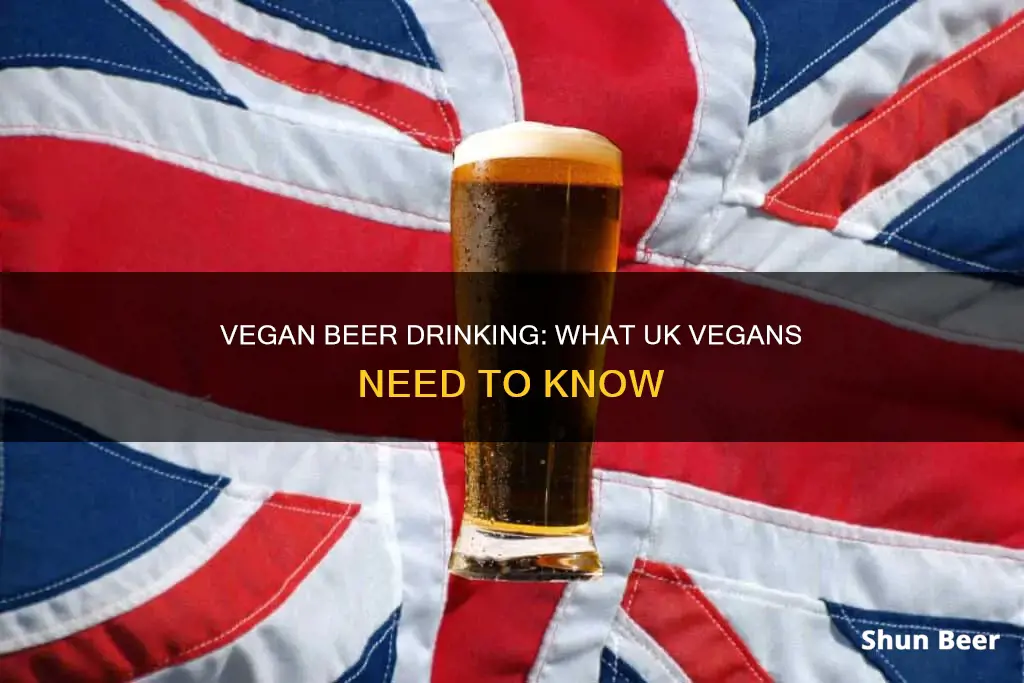
Beer is commonly made from barley malt, water, hops, and yeast, which are all vegan ingredients. However, some brewers add finings, or clarifying agents, during the brewing process, which are not always vegan. These finings can include animal-derived products such as isinglass (made from fish swim bladders), gelatin (derived from animal bones and ligaments), glycerin, and casein (a milk protein). As vegans seek to exclude products that exploit or harm animals, beers containing these ingredients are not considered vegan.
In the UK, it is relatively easy to find vegan beers, and there are several online resources, such as Barnivore, that provide lists of vegan-friendly alcoholic drinks. Some popular vegan beers in the UK include Budweiser, Coors, Carlsberg, and all Sam Smith's beers except Yorkshire Stingo and Old Brewery Bitter.
| Characteristics | Values |
|---|---|
| Main ingredients | Water, hops, yeast, grain (usually barley) |
| Non-vegan ingredients | Isinglass, gelatin, glycerin, casein, lactose, honey, eggs, milk, chitosan, whey |
| Vegan alternatives to isinglass | Bentonite, Irish moss, PVPP, silica gel, activated carbon, pectinase, carrageenan, pea protein |
| Online resources to find vegan beer | Barnivore, The Vegan Society, PETA |
What You'll Learn
- Isinglass, a substance made from the dried swim bladders of fish, is used to clarify beer
- Gelatin, derived from animal collagen, is also used to clarify beer
- Lactose, a sugar derived from milk, is added to beer for sweetness
- Honey is added to beer for flavouring and sweetness, but it is not vegan
- Casein, a protein derived from milk, is sometimes used to clarify beer

Isinglass, a substance made from the dried swim bladders of fish, is used to clarify beer
Isinglass is a substance made from the dried swim bladders of fish. It is used in the beer-making process to clarify the beverage, or as a fining agent. Fining agents are used to remove sediment from beer, such as yeast, tannins, and proteins, which may otherwise alter the taste and appearance of the final product.
Isinglass is derived from the swim bladders of certain tropical and subtropical fish. The bladders are removed, processed, and dried, then formed into various shapes. When macerated and dissolved for several weeks in dilute food-grade acids, they form a turbid, colorless, viscous solution largely made up of the protein collagen. This material is known to brewers as isinglass finings.
The collagen in isinglass is a highly ordered, positively charged helical polymer. When used as a fining agent, it can quickly settle yeast and beer proteins, and can do so repeatedly. This property is particularly useful for cask-conditioned ales, where the casks may be moved several times before serving.
The origin of the use of isinglass in beer-making is unclear. One theory suggests that a resourceful fisherman once used a fish bladder to store beer, perhaps noticing that the beer became clear after being poured into a drinking vessel.
While isinglass was traditionally derived from sturgeon, modern commercial isinglass is often derived from tropical estuarine dwellers, such as the Nile Perch from Lake Victoria, where it is considered an invasive species. The best quality finings originate in the South China Sea and are identified as Round Saigon or Long Saigon finings.
With advancements in centrifugation and filtration technologies, the use of isinglass in the commercial brewing process has declined. Today, it is mainly used for cask-conditioned ales and by some craft brewers to clarify beer without filtration.
Tooth Extraction and Beer: What's Safe?
You may want to see also

Gelatin, derived from animal collagen, is also used to clarify beer
Gelatin is a common fining agent used to clarify beer. It is derived from animal collagen, often sourced from cow or pig bones, skin, and connective tissues. The process of fining with gelatin involves adding gelatin to beer that has been chilled to a very cold temperature, typically between 32-40°F (or around 0°C). This causes haze-forming particulates to drop out of the beer, resulting in a clearer appearance.
Gelatin is typically added to the beer in either a fermenter or directly in the serving keg. The amount of gelatin used depends on the volume of beer being fined, with a general ratio of 1/2 teaspoon of gelatin to 1/4 to 2/3 cup of water for every 5 gallons of beer. It is important to use unflavoured gelatin, as flavoured gelatin can affect the taste of the beer.
When adding gelatin to the beer, it is crucial to avoid introducing oxygen into the brew, as this can stale the beer. This can be done by purging the headspace with CO2 or using other methods to minimise oxygen exposure. After adding the gelatin, the beer is typically left for 24-48 hours to allow the gelatin to work, and then the clarified beer is packaged or served.
While gelatin is an effective method for clarifying beer, it is not suitable for vegans due to its animal-derived source. There are alternative fining agents available, such as Irish moss, bentonite, and silica gel, which can be used to produce clear beer without the use of animal products.
Mixing Beer and Xanax: What You Need to Know
You may want to see also

Lactose, a sugar derived from milk, is added to beer for sweetness
Lactose, a sugar derived from milk, is sometimes added to beer to make it sweeter. Lactose is a disaccharide composed of galactose and glucose, which has a mildly sweet taste. It is added to beer because, unlike most other sugars, it cannot be fermented and so does not convert to alcohol during the manufacturing process.
Lactose is a sugar found naturally in milk, and it makes up around 2-8% of milk by mass. It is also present in other dairy products such as cheese and yoghurt, although in smaller quantities as the bacteria used to make these products breaks down lactose.
Historically, lactose was only added to milk stouts, but in recent years, craft breweries have been experimenting with adding lactose to other types of beer to change the flavour profile.
Lactose is not always listed as an ingredient on beer packaging, as UK law states that ingredients do not have to be listed on packaging for beers stronger than 1.2% ABV. However, allergens must be declared, which includes milk products like lactose, so this can be a way to identify if a beer contains lactose.
Lactose is not commonly used in traditional beer production, but when it is added, it imparts sweetness and creaminess to the finished product. It is important to note that lactose is not the only animal-derived ingredient that may be present in beer. Other ingredients to look out for include isinglass, gelatin, albumin, casein, honey, and chitosan.
For vegans, it is essential to check how beer has been made and whether it contains any animal-derived ingredients. While not all beer is vegan, there are many vegan options available, including popular brands such as Heineken, Corona, and Budweiser.
The Science Behind Beer Koozies: Do They Really Work?
You may want to see also

Honey is added to beer for flavouring and sweetness, but it is not vegan
Honey is not vegan because it is produced by bees, which are insects, and vegans do not consume animal products. In addition, the process of harvesting honey often involves the exploitation and mistreatment of bees, which is not aligned with the ethical principles of veganism.
Honey is just one of several animal-derived ingredients that may be used in beer production. Others include lactose, a sugar derived from milk; castoreum, a secretion from mature beavers; and various fining agents used for clarification, such as isinglass (derived from fish swim bladders), gelatin (derived from animal collagen), and casein (a protein found in milk).
While not all beers are vegan, there are many vegan options available, including popular brands such as Heineken, Corona, Budweiser, and Guinness. It is important for vegans to check the ingredients or look for vegan certification to ensure that their chosen beer is free from animal products.
Beer and No-Carb Diets: What You Need to Know
You may want to see also

Casein, a protein derived from milk, is sometimes used to clarify beer
Beer is usually made from just four ingredients: water, hops, yeast, and grain (usually barley, but sometimes wheat, rice, millet, or corn). However, some breweries may add further ingredients derived from animals or use animal-based manufacturing processes that make the end product unsuitable for vegans.
One such animal-derived ingredient is casein, a protein found in milk and dairy products. In beer production, casein is sometimes used as a fining agent to clarify the beer by binding to suspended particles and yeast, aiding in their precipitation and removal. This process is called fining and has traditionally been done with isinglass or sometimes gelatine.
Isinglass is a substance obtained from the dried swim bladders of fish, typically sturgeon. It is used in beer production as a fining agent to clarify the beer by removing yeast and other particles, resulting in a clearer appearance.
Gelatine is derived from animal collagen, often sourced from cow or pig bones, skin, and connective tissues. It is used as a fining agent in beer to help clarify the liquid by binding to particulate matter and yeast, aiding in their removal during filtration.
While not all beers are vegan, there are a number of vegan-friendly options available, including Heineken, Corona, Budweiser, and Guinness, which recently modified its production process to make it vegan-friendly.
To Drink or Not: Beer and Dental Fillings
You may want to see also
Frequently asked questions
Beer is usually made from barley malt, water, hops and yeast, which are all vegan ingredients. However, some brewers add finings that are not vegan during the brewing process, such as isinglass, gelatin, glycerin or casein.
Non-vegan finings are used to clarify the beer and speed up the production process.
It can be difficult to know if a beer is vegan or not, as brewers are not required to list ingredients on packaging for beers stronger than 1.2% ABV. You can check for allergens, such as milk products, or look for vegan certification. You can also use online resources like Barnivore, which lists over 44,000 vegan-friendly alcoholic drinks.
Some vegan-friendly beers available in the UK include Budweiser, Coors, Carlsberg, Boddingtons, Heineken, Corona, and Beck's.







